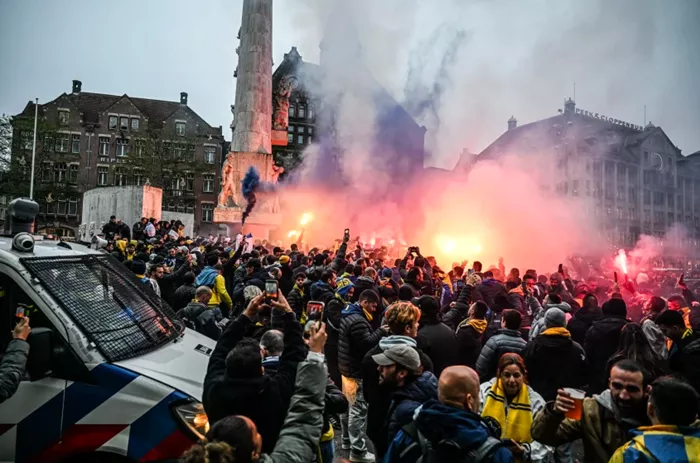What began as violent confrontations between locals and Israeli soccer fans has quickly escalated into a broader societal crisis in the Netherlands, exposing deep racial and religious divides. Many now feel their place in Dutch society is fragile, their sense of belonging uncertain, and their voices drowned out by growing tensions and blame.
The resignation of a Moroccan-born minister has added to the turmoil, highlighting the ongoing racial and religious rifts, from the streets to the government. The violence began earlier this month in Amsterdam, surrounding a football match between Ajax, a Dutch team, and Israel’s Maccabi Tel Aviv. Authorities report that rioters targeted Israeli supporters, resulting in five injuries, while some Israeli fans also provoked violence, shouting inflammatory slogans like “Death to the Arabs” and “Let the IDF win.”
The unrest has intensified fears within the Jewish community, while also revealing underlying frustrations over anti-Muslim sentiment and Islamophobia in the Netherlands.
Dutch politician Geert Wilders, leader of the far-right anti-Islam Freedom Party (PVV), blamed “Moroccans who want to destroy Jews” for the violence, calling for severe punishments, including deportations. Meanwhile, Prime Minister Dick Schoof also pointed to the attackers’ “immigration background,” suggesting a broader issue of integration among Moroccan immigrants, a remark analysts warn risks unfairly blaming an entire community.
Around 420,000 people of Moroccan descent live in the Netherlands, making up 2.3% of the population. Dutch police have yet to disclose the identities of those arrested in connection with the violence.
The incident has prompted the resignation of Deputy Finance Minister Nora Achahbar, a Moroccan-born official who stepped down in protest after hearing alleged racist remarks during a Cabinet meeting. Achahbar said she could no longer perform her duties effectively due to the “polarizing interactions” in recent weeks. Her resignation has shaken the fragile coalition government, with other members threatening to follow suit.
The government’s failure to take immediate action following the attacks has deepened discontent. Achahbar did not reveal the specifics of the remarks, but Schoof denied that any ministers were racist, though he did not address whether any offensive comments were made.
The controversy has thrown a spotlight on rising Islamophobia in the Netherlands. A report from the European Union Agency for Fundamental Rights found that 50% of Dutch Muslims faced discrimination last year, a figure well above the European average of 38%. In another report, 72% of Dutch Jews expressed concern about growing hostility toward Jews in public spaces.
Nassreddin Taibi, a Dutch-Moroccan postgraduate student, voiced his frustration, stating that Muslims and Moroccans still aren’t viewed as full citizens, even after several generations in the Netherlands. “My position in society, my nationality, is never secure,” Taibi said. “I always have to defend who I am.”
Taibi also criticized the government’s focus on anti-Semitism without addressing the racism directed at Muslims and Moroccans, pointing to offensive language that has emerged in the media. “Imagine similar rhetoric being used against Jews. One wouldn’t politically survive for a minute,” he said.
Bram Beute, a Protestant church leader in Amsterdam’s Muslim-majority Nieuw-West neighborhood, warned that the government’s focus on “failed integration” overlooks the broader societal issues contributing to the tensions. “Many young people face discrimination in the job market just because of their surname,” he said, adding that integration must be a shared responsibility between the government and society.
The rise of right-wing politics in the Netherlands, especially after Geert Wilders’ PVV party dominated the 2023 elections, has fueled these divisions. Wilders’ party has advocated for drastic measures against Islam, including banning mosques and the Quran. His inflammatory rhetoric against Moroccans, calling them “scum” during a 2016 campaign, has only intensified tensions.
Francesca Albanese, a UN Human Rights Council expert, noted that Islamophobia is increasingly visible across Europe, often manifested in anti-Palestinian sentiment. But in the Netherlands, the current unrest among Muslims predates the Gaza conflict and the right-wing government.
Sociology professor Bert Klandermans suggested that the violence in Amsterdam reflects deeper, long-standing frustrations with systemic inequality. Teachers in the predominantly Moroccan Nieuw-West area, like Steven Silvester, described a tense political climate, with young people feeling the weight of a right-wing government determined to highlight their perceived failures.
Some critics accuse Wilders and Schoof of exploiting the violence for political gain, using it to further polarize society. Muhsin Köktas, CEO of the Dutch Muslim organization CMO, argued that politicians should focus on uniting the country rather than stoking division.
For Jewish communities, the violence surrounding the soccer match has been deeply unsettling. Ruben Vis, spokesperson for the Centraal Joods Overleg, a representative body for Jewish communities in the Netherlands, said many Jewish residents felt “really frightened” after the attacks.
As the social and political fallout from the violence continues, both Jewish and Muslim communities in the Netherlands fear the lasting impact of these divisions. Many are left questioning whether the country’s leadership can address the root causes of these tensions or whether the rhetoric of blame will only deepen the divide.
“If a minister can say such things about Moroccans, then everyone is allowed to say that, right?” Taibi said, underscoring the profound sense of insecurity felt by marginalized communities.
Related topics:
- Santa Barbara County’s Immigration Resources Are More Robust Than Ever
- How Biden Can Strengthen U.S. Immigration Policy: Key Options to Consider
- Trump’s Immigration Crackdown Set to Begin on Day 1


